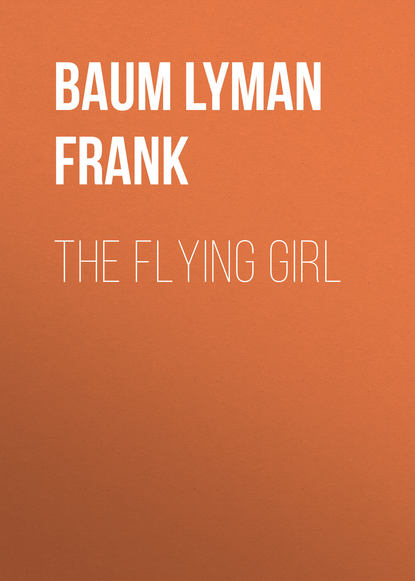По всем вопросам обращайтесь на: info@litportal.ru
(©) 2003-2024.
✖
The Flying Girl
Настройки чтения
Размер шрифта
Высота строк
Поля
“Pardon me, sir,” said Stephen Kane, who was present, “I know something about airships, and I am sure I can repair Mr. Willard’s, if you will take the job.”
The aviator turned to him gratefully.
“Thank you,” he said; “I’ll put my machine in your hands. What experience have you had with biplanes of this type?”
“None at all,” was the answer; “but I am sure you will not find an experienced airship man in this city. I’ve studied the devices, though, ever since Montgomery made his first flights, and as we have all the requisite tools and machinery here I am sure, with your assistance and direction, I can readily put your machine into perfect condition.”
He did, performing the work excellently. Before long another biplane needed repairs, and Stephen was recommended by Mr. Willard. Later a Curtiss machine came under Steve’s hands, and then an Antoinette monoplane. The manager raised the young fellow’s salary, proud that he had a man competent to repair these new-fangled inventions which were creating such a stir throughout the country.
Stephen Kane might have continued to follow the calling of an expert aëroplane doctor with marked success, had he been an ordinary young mechanic. But the air castles he had built at college were not all dissipated, as yet, and aside from possessing decided talent as a workman Steve had an inventive genius that promised great things for his future. By the time he had taken a half dozen different aëroplanes apart and repaired them he had a thorough knowledge of their construction and requirements, and the best of them seemed to him wholly inadequate for the purpose for which they were planned.
“The fact is, Ris,” he said to Orissa one evening, after he had been poring over a book on air currents, “the airships of to-day are all experimental, and chock full of mistakes. No two are anywhere near alike, and each man thinks he has the only correct mechanism.”
“But they fly,” answered the girl, who was keenly interested in the subject of aviation and had twice been down to the shop to examine the aëroplanes Steve was repairing.
“So they do; they fly, after a fashion,” admitted the young man, “which fully proves the thing can be accomplished. But present machines are all too complicated, and the planes seem to have been shaped by guesswork, rather than common sense. They fuss with motors and propellers and ignore the sustaining mechanism, which is the most vital principle of all. Some day we shall see the sky full of successful aviators, and flying will be as common as automobiling now is; but when that time comes we shall laugh at the crude devices they brag of to-day.”
“That may be true,” returned the girl, thoughtfully; “but isn’t it true of every great invention, that the first models are imperfect?”
“Quite true,” said he. “I can make a better biplane than any I have seen, but I admit that had I not had the advantage of seeing any I might have blundered as all the rest seem to have done.”
“Why don’t you make one, Steve?” asked Orissa impulsively. “If aviation is going to become general the man who builds the best aëroplane will make his fortune.”
Steve flushed and rose to tramp up and down the room before he answered. Then he stopped before his sister and said in low, intense accents:
“I long to make one, Orissa! The idea has taken possession of my thoughts until it has almost driven me crazy. I can make a machine that will fly better and be more safe and practical than either the Wright or Curtiss machines. But the thing is impossible. I – I haven’t the money.”
Orissa sat staring at the rug for a long time. Finally she asked:
“How much money would it take, Steve?”
He hesitated.
“I don’t know. I’ve never figured it out. What’s the use?”
“There is use in everything,” declared his sister, calmly. “Get to work and figure. Find out how much you need, and then we’ll see if we can manage it.”
He gazed at her as if bewildered. Then he turned and left the room without a word.
A few evenings later he handed her an estimate.
“I think it could be done for three thousand dollars,” he remarked. “Which means, of course, it can’t be done at all.”
Orissa took the paper without replying and pondered over it for several days. She was only seventeen, but had inherited her father’s clear, business-grasping mind, and would have been an essentially practical girl had not her youth and inexperience lent her some illusions that time would dissipate.
Stephen posed as the “head of the family;” but Orissa really directed its finances, poor Mrs. Kane being so helpless that her children never depended upon her for counsel but on the contrary kept all business matters from her, lest she worry over them. The one maid employed in the bungalow served Mrs. Kane almost exclusively, while Orissa always had devoted much time to her mother, who had been stricken blind at the time of her daughter’s birth.
One evening, when brother and sister were in the garden together, the girl said:
“I believe I have discovered a plan that will permit you to build your airship. What is it to be, Steve; a biplane or a monoplane?”
“Let me hear your plan,” was the eager reply.
“Well, I’ve been to see Mr. Wentworth, and he will advance us fifteen hundred on our orange crop, by discounting the price ten per cent. He came and looked at the trees and said they were safe to pay us at least twenty-three hundred dollars next February.”
“But – Orissa! – how could we live, with our income cut down that way – to a mere seven or eight hundred dollars?”
“I’m going to work,” she said quietly. “I’m tired of doing nothing but dig around the garden and cook. Mamma doesn’t need me, at least during the day, so I’m going into business.”
Steve smiled.
“You work, Orissa? What on earth could you do?”
“I’ll find something to do. And my salary, added to yours, will make up for the loss of the orange money. We must economize, of course; but when we’ve such a big deal on hand – one that will make our fortune – we can put up with a few temporary discomforts.”
“But fifteen hundred won’t build the thing, that is certain,” he said, with a sigh. “I’ve got to construct an entirely new motor – engine and all – and some original propellers and elevators, and the patterns and castings for these will be rather expensive.”
“Well, by the time the fifteen hundred are gone,” she replied, “you will know exactly how much more money is needed, and we will mortgage the place for that amount.”
“Rubbish!” cried Stephen, impatiently. “I won’t listen an instant to such a wild plan. Suppose I fail?”
“Oh, if you’re going to fail we won’t undertake it,” said his sister. “You claimed you could make a better airship than the Curtiss or the Wright – either one of which is worth a fortune – and I believed you. If you were only joking, Steve, we won’t talk of it any more.”
“I wasn’t joking; or bragging, either; you know that, Orissa. I’m pretty sure of my idea; but it’s untried. I’ve bought all the books on aviation I can find and I’ve been reading of Professor Montgomery’s discovery of the laws of air currents and his theories concerning them. They’re only primers, dear, for the science of aviation is as yet unwritten. That is why I cannot speak with perfect assurance; but the more I look into the thing the more positive I am that I’ve hit upon the right idea of aërial navigation.”
“What is your idea?” she asked.
“To simplify the construction of the craft. The present devices are all too complicated and keep the aviator too busy while he’s in the air.”
“In other words, he’s all up in the air while he’s up in the air,” she remarked.
“Precisely. Most of his time is required to maintain a lateral balance, so as not to tip over or lose control. I’m to have a simpler construction, an automatic balance, and a plane only large enough to support the machinery and the aviator.”
“If you can manage that,” said Orissa, “we’re not taking any chances.”
He sat with furrowed brow, thinking deeply. Finally he said in a decisive way:
“Nothing is certain until it is accomplished. I won’t take the risk of making you and mother paupers. Please don’t speak of the thing again, Ris.”
Orissa didn’t; but Steve did, about a month later. A great aviation meet had been arranged at Dominguez Field, near Los Angeles and only a few miles from their own home. The event, which was destined to be an epoch in the history of aviation, brought many famous aviators to the city with their machines, among them a Frenchman named Paulhan, with whom Stephen soon became acquainted. An examination of Paulhan’s machine, a Farman of the latest type, which had already performed marvels, served to convince the boy that his own ideas were not only practical but destined soon to be discovered and applied by someone else if he himself failed to take advantage of the time and opportunity to utilize them. With that argument to calm any misgivings that he might perhaps fail, coupled with an eagerness to build his invention that drove him to forsake caution, Steve went to Orissa one day and said:
“All right, dear; I’m going to undertake the thing. Can you still get Mr. Wentworth to advance the money?”
“I think so,” she replied.
“Then get it, and I’ll start work at once. The drawings are already complete,” and he showed them to her, neatly traced in comprehensive detail.
Most girls would have been bewildered by the technicalities and passed the drawings with a glance; but Orissa understood how important to them all this venture was destined to be, so she sat down and studied the designs minutely, making her brother explain anything she found the least puzzling. By this time the girl had made herself familiar with the latest modern improvements in aëroplanes and had personally examined several of the best devices, so she was able to catch the true value of Stephen’s idea and immediately became as enthusiastic as he was.

















